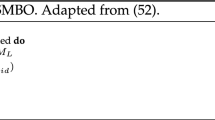
Overview
- Provides a comprehensive introduction to Learning Classifiers Systems
- Principle approach to understand, analyze, and design Learning Classifier Systems
- Includes supplementary material: sn.pub/extras
Part of the book series: Studies in Fuzziness and Soft Computing (STUDFUZZ, volume 191)
Buy print copy
About this book
Similar content being viewed by others
Keywords
Table of contents (13 chapters)
-
Front Matter
-
Back Matter
Authors and Affiliations
Bibliographic Information
Book Title: Rule-Based Evolutionary Online Learning Systems
Book Subtitle: A Principled Approach to LCS Analysis and Design
Authors: Martin V. Butz
Series Title: Studies in Fuzziness and Soft Computing
DOI: https://doi.org/10.1007/b104669
Publisher: Springer Berlin, Heidelberg
eBook Packages: Engineering, Engineering (R0)
Copyright Information: Springer-Verlag Berlin Heidelberg 2006
Hardcover ISBN: 978-3-540-25379-2Published: 24 November 2005
Softcover ISBN: 978-3-642-06477-7Published: 12 February 2010
eBook ISBN: 978-3-540-31231-4Published: 04 January 2006
Series ISSN: 1434-9922
Series E-ISSN: 1860-0808
Edition Number: 1
Number of Pages: XXI, 259
Topics: Theory of Computation, Mathematical and Computational Engineering, Artificial Intelligence, Neurosciences, Applications of Mathematics



